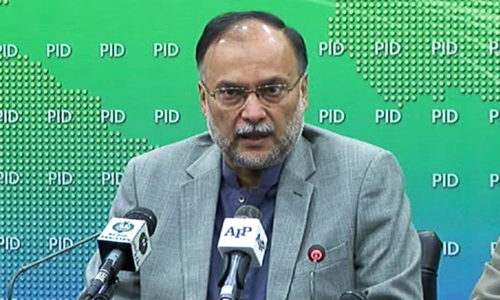ISLAMABAD: Some members of the federal cabinet on Tuesday raised concern over the fact that agriculture had been totally ignored in the multi-billion-dollar China-Pakistan Economic Corridor (CPEC), sources told Dawn.
Responding to the objections by the ministers during the cabinet meeting, Interior Minister Ahsan Iqbal, who is also heading the planning and development division, admitted that agriculture had not been included in the first phase of CPEC, but claimed that the sector had already started receiving benefits from the ongoing energy projects.
The concern was raised by Minister for National Food Security and Research Sikandar Bosan and Privatisation Minister Daniyal Aziz during a briefing by the officials concerned to the cabinet on CPEC projects.
Mr Iqbal explained that due to the conversion of tube-wells from diesel to solar and electric power, the fuel cost had already come down benefitting farmers. He said that the Chinese had prioritised improving the energy situation and infrastructure in Pakistan before initiating other projects. Therefore, he added, agriculture had been included in the second phase of the CPEC.
Idea of allowing overseas Pakistanis to vote from abroad opposed
The sources said other ministers endorsed the interior minister’s viewpoint and agreed that the agriculture sector had started receiving benefits from the CPEC already.
Earlier, the federal cabinet which met under Prime Minister Shahid Khaqan Abbasi was given a briefing on the CPEC, including various projects being undertaken in the energy sector and infrastructure, industrial cooperation and development of Gwadar.
The sources said the focus of the briefing was on energy projects and different development projects for Gwadar, including construction of the country’s biggest airport, improvement of roads and establishing a railway link.
According to an official handout, the cabinet members were told that the energy sector and infrastructure development constituted the major areas in the first phase of the CPEC and various energy sector projects being set up under the CPEC would contribute over 17,000 megawatt of electricity to the national grid on completion.
The cabinet was told that the CPEC would significantly help in ensuring inclusive development, especially targeting socio-economic development of less-developed areas of the country. It was claimed that CPEC projects would help increase GDP growth and strengthen the national economy.
The cabinet meeting also addressed concerns of indiscriminate allocation of grants to bar councils and associations of the country. One of the cabinet members told Dawn that they had devised a formula to guarantee distribution of grants among lawyers’ bodies in accordance with their membership size. He said in the past, governments used to allocate funds to bar councils and associations based on their political affiliations.
While reviewing a summary regarding rationalisation of the fees of computerised national identity cards (CNICs) and national identity cards for overseas Pakistanis (NICOP) in line with the Supreme Court’s directives, the cabinet members also held a brief debate on the issue of right of vote to overseas Pakistanis.
During the discussion, the participants were told that overseas Pakistanis already had the right to vote and they could exercise it by travelling to Pakistan during the polls.
But several participants feared that allowing the emigrants to cast their votes from outside Pakistan could raise security concerns.
Meanwhile, the cabinet approved the summary to rationalise prices of NICOP as per directives of the Supreme Court.
Chief Justice of Pakistan Mian Saqib Nisar had taken suo motu notice of exorbitant fees being charged for the issuance of NICOP and CNICs and cancellation of the Pakistan origin card.
At the previous hearing of the case last month, the National Database and Registration Authority (Nadra) had pleaded through a report before the court that an arrear of Rs2.5 billion, which the federal government owed to the authority, might affect Nadra’s sustainability.
The court had been told that Nadra did not take any funding from the government for running its vast operations nationwide and worldwide.
Nadra had explained that the Rs2.5bn dues were in view of the federal government’s decision to make the first time issuance of the cards free of cost to the citizens and to partially bear the cost. The cabinet decision will be placed before the Supreme Court which will hear the case again on Wednesday (today).
Published in Dawn, April 4th, 2018













































